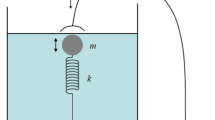
Overview
- Focuses on the modeling of fractional kinetics or dynamic behaviors
- Presents research on several classes of models capable of capturing long memory power-law type behaviors
- Describes modeling tools other than fractional models and explains how they solve their limitations and drawbacks
Part of the book series: Intelligent Systems, Control and Automation: Science and Engineering (ISCA, volume 101)
Access this book
Tax calculation will be finalised at checkout
Other ways to access
About this book
This book is dedicated to the analysis and modelling of fractional behaviours that mainly result from physical stochastic phenomena (diffusion, adsorption or aggregation, etc.) of a population (ions, molecules, people, etc.) in a constrained environment and that can be found in numerous areas. It breaks with the usual approaches based on fractional models since it proposes to use unusual models which have the advantage of overcoming some of the limitations of fractional models.
This book is dedicated to postgraduated students and to researchers in the field or those who wish to learn with a fresh perspective. After a review of fractional models and their limitations, it proposes and demonstrates the interest of four other modelling tools to capture fractional behaviours: new kernels in integral operators, Volterra equations, nonlinear models and partial differential equations with spatially variable coefficients. Several applications on real data and devices illustrate theirefficiency.
Similar content being viewed by others
Keywords
Table of contents (8 chapters)
Reviews
Authors and Affiliations
Bibliographic Information
Book Title: Fractional Behaviours Modelling
Book Subtitle: Analysis and Application of Several Unusual Tools
Authors: Jocelyn Sabatier, Christophe Farges, Vincent Tartaglione
Series Title: Intelligent Systems, Control and Automation: Science and Engineering
DOI: https://doi.org/10.1007/978-3-030-96749-9
Publisher: Springer Cham
eBook Packages: Intelligent Technologies and Robotics, Intelligent Technologies and Robotics (R0)
Copyright Information: The Editor(s) (if applicable) and The Author(s), under exclusive license to Springer Nature Switzerland AG 2022
Hardcover ISBN: 978-3-030-96748-2Published: 19 March 2022
Softcover ISBN: 978-3-030-96751-2Published: 20 March 2023
eBook ISBN: 978-3-030-96749-9Published: 18 March 2022
Series ISSN: 2213-8986
Series E-ISSN: 2213-8994
Edition Number: 1
Number of Pages: IX, 134
Number of Illustrations: 14 b/w illustrations, 44 illustrations in colour
Topics: Control and Systems Theory, Control, Robotics, Mechatronics, Complexity, Systems Theory, Control



